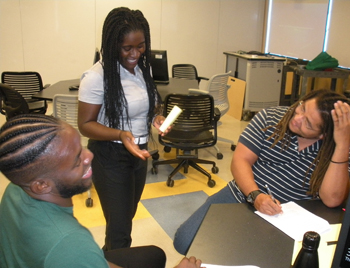CSU Physics Receives Award From American Physics Society
 The Chicago State University (CSU) physics program is a 2018 recipient of a national
award for Improving Undergraduate Physics Education from the American Physical Society’s
(APS) Committee on Education.
The Chicago State University (CSU) physics program is a 2018 recipient of a national
award for Improving Undergraduate Physics Education from the American Physical Society’s
(APS) Committee on Education.
The CSU physics program is one of only three programs in the country to be recognized as a Program of Distinction this year. The APS award recognizes excellence in undergraduate physics education and supports best practices in education at the undergraduate level.
CSU has experienced a steady increase in the number of physics majors in recent years. The number of students of color graduating with degrees in physics during this period is among the largest in the nation. CSU graduated about 3% of the nation’s African-American physics majors in the 2015-16 academic year.
“Our innovative teaching approach and research opportunities are two of the key reasons for this honor from APS,” said Dr. Mel Sabella, professor of physics in the Department of Chemistry, Physics and Engineering Studies. “The strength of our program is rooted in student input, in terms of how we teach and how we engage in undergraduate research. Students, who have an amazing amount of expertise, take on leadership roles in our instructional environments and actively think and co-think with faculty about the best way to support their peers in the classroom and in their research.”
CSU’s physics classes are characterized by active engagement and the instructional materials are guided by results from education research. One significant aspect of the physics program’s unique teaching style is the Learning Assistant Program (LAP), which is a nationally recognized peer instruction program. The Learning Assistant Model is implemented at over 70 institutions around the country. Learning assistants are undergraduate students who, through the guidance of weekly preparation sessions and a pedagogy course, facilitate discussions among groups of students in a variety of classroom settings encouraging active engagement.
In addition to high-quality teaching, CSU students engage in diverse areas of physics and engineering research and all CSU students complete a senior thesis, placing them in an excellent position for future careers or graduate programs. For instance, CSU students and faculty conduct international research, as one of only two undergraduate institutions in the ALICE Collaboration. ALICE is one of the primary experiments at the Large Hadron Collider at CERN, the European Organization for Nuclear Research, in Switzerland. ALICE explores how matter behaved immediately after the Big Bang. Students conduct research, as part of ALICE, in Switzerland every summer.
Dr. Austin Harton, Chair of the Department of Chemistry, Physics and Engineering Studies, believes the CERN experience has been transformative for CSU students. “The opportunity to conduct research abroad in the number one physics laboratory in the world, with the top physics researchers in the world, is life changing. Our students work in teams with international students from a variety of countries and cultures, while working to contribute to a larger, very important project,” said Dr. Harton. “One student told me the summer at CERN changed his life.”
The CSU Department of Chemistry, Physics and Engineering Studies is a recipient of numerous awards and grants in recent years, including four from the National Science Foundation (NSF).
For more information on this award click here.

 All Rights Reserved
All Rights Reserved